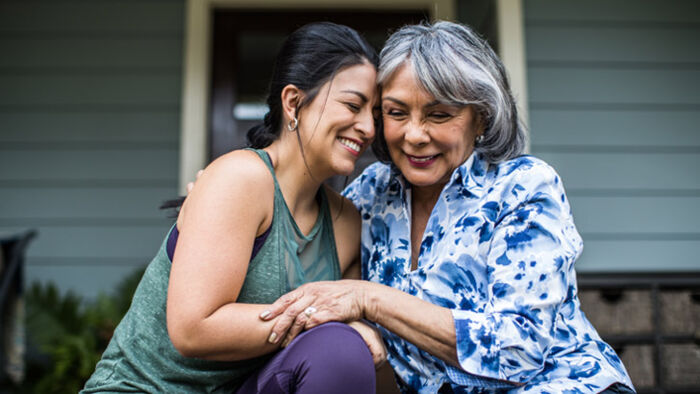When your adult kids can't afford to move out of home
By Susan Hely
"He's 18. He's finished school. I've done my job to get him there. It's up to him now," a friend of mine told me recently.
I understood where she was coming from, but my experience is that parents are still involved - particularly financially - in the next phase of their kid's life from 18 up to when they establish themselves in the workforce. Most likely she will have him living at home for several more years.
In fact, even after your kids have finished studying, they may still be living at home, according to census data. Around 50% of all 20- to 24-year-olds still live in the parental home, up from 33% in 1981. Men are more likely to stay at home than women.
Young adults are facing greater financial burdens and uncertainties. There is a shortage of affordable housing, rents are rising and financial issues, such as tertiary education debt, mean they are reluctant to move out of home.
Often parents provide valuable financial and emotional support to their adult children while they save money and work on their career. It can be a mutually beneficial arrangement for both parents and adult children.
Parents are typically generous when it comes to their own children and some provide food and pay utility bills. They lend them the family car, not to mention doing their laundry, their cooking and their share of the housework.
Parents feel the pressure
Older parents who had their kids in their late thirties or even their forties feel the pressure to keep working to help support their twenty-somethings. And unless they make it clear otherwise, their adult children expect the generosity to continue.
Adult kids may assume their parents are well off, but this isn't necessarily the case. Parents should not neglect their own retirement savings and plans.
After all, moving out of home is an important step towards financial independence and building a life and career away from parents. But only about 20% of young adults have moved out of home by the age of 21.
The rite of passage - the shared house - is out of reach for many young adults.
Unpredictable rents are making it hard for young people to plan. The rent that my daughter's shared house was paying jumped by 40% last November when interest rates reached 2.85%.
The landlord, a wealthy owner with multiple properties, blamed interest rate rises. There was no way for the tenants to know his debt level or even if he had a mortgage. Then he announced he would lift the rent again six months later by 10%. They are looking for a large, affordable house but finding it difficult.
Some cultural groups do encourage their adult kids to live in the family home. Lixia Qu, researcher at the Institute of Family Studies, says young adults with Asian, Middle Eastern, African
or southern and eastern European ancestry are more likely to live with their parents compared with those with Australian, north-western European or New Zealand backgrounds.

Set the ground rules
Parents should establish the ground rules with adult kids, such as who does which chores.
Work out the finances, too. What can your young adult contribute each week?
Then there is the conversation about respectful behaviour with relationships. Would parents feel comfortable with a partner in the house as well? It isn't only the parents who have to adapt to their adult kid's social life and partners; adult kids may have to learn to live with a parent's new partner, too.
Parents who want their kids to be self-supportive can help them draw up an exit plan. Even if moving out is a few years down the track, when they can afford rent and a decent lifestyle, it's a good idea to encourage them to be independent and have their own life.
It is always worth dropping into the conversation the line "when you move out of home ..." so that they don't view living in the parental home as a permanent arrangement.
Adult kids with jobs may live at home to pay down their student debt and save for a home deposit. They need to be saving hard to reach a deposit, not taking regular overseas holidays and spending their disposable income.
Charging your working kids some rent is a worthwhile habit that teaches them financial discipline.
For example, a work colleague asked her son to pay about half a commercial rent. Unbeknown to him, she deposited it in a separate account and handed it over later when he and his wife were looking to buy a home.
Generosity has limits
Some parents who have money to spare and are eager to launch their kids contribute to their rent away from home. But you must think this generous strategy through. When will you stop doing it? I know parents who are helping adult kids and their partners well into their thirties.
On the other hand, I also know some young adults who have saved a 20% deposit by living at home for years. But it is more common for parents to come to the party with some money so that the kids get a deposit more quickly without having to pay costly lenders mortgage insurance. These days, even two incomes may not be enough to get onto the property ladder.
The bank of mum and dad (BOMAD) helps kids buy a home by either going guarantor on the deposit or lending or gifting them some money as an advance on an inheritance. But the BOMAD has taken a bit of a hit as parents worry about rising interest rates, the potential for negative equity in their home, volatile property markets and how all this impacts their own finances.
You want your kids to have some stability when they move out, either a steady job or a relationship. Also important are life skills, such as cooking and cleaning.
The empty nest period can be a great time for parents to live like a free, young person again. If you miss your kids once they move out, take heart that you will find they may come and go over the years, depending on what is happening in their finances or love lives.
Qu says that as young adults move towards 30, fewer remain at home, with only around 7% still in the family residence by the time they are 30 to 34.
How to devise an exit plan
You can help your kids to work towards moving out of home by:
- Insisting they save some money from their part-time work to instil financial discipline.
- Asking them to pay some rent so they get used to the idea.
- Making sure your kids establish an emergency fund in case of any unforeseen events, such as losing their job.
- Building a collection of household items for when they move out. Let relatives and friends know if they are getting rid of furniture or whitegoods. Or check council clean-ups or free market websites.
- Encouraging them to find a viable house with affordable rent, sharing with people who can meet their financial commitments, such as bill deadlines. An unemployed housemate may not be ideal.
- Working out what percentage of your adult child's income should be spent on market rent. Ideally, around 20%-25% but there are cases of 40%-50%.
- Helping them secure a lease. It can be difficult for young casual workers. I know parents who have taken out a lease in their own name for their kids.
- Making sure your adult kids can cook basic meals to moderate their food bill, and to shop with a budget.
Get stories like this in our newsletters.



